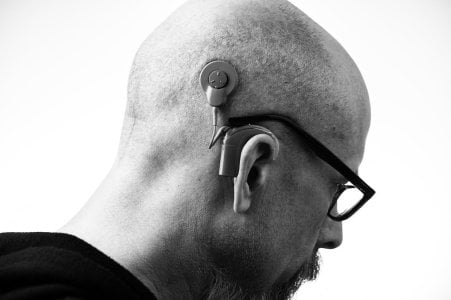Want to reduce your risk of dementia? A study found that this surprising device may help
- Replies 3
We all know that age plays a major role when it comes to cognitive decline.
Unfortunately, the old adage 'you can't turn back time' is true when it comes to brain health, but the good news is there are things you can do to preserve your mental health as you age.
One of the most interesting developments in the field of age-related mental health is the recent finding that wearing hearing aids could be beneficial for older adults, possibly even reducing the risk of developing dementia.
This exciting news comes from a study conducted by researchers at the Johns Hopkins Bloomberg School of Public Health in the U.S..
After analysing data from a national dataset called the National Health and Ageing Trends Study, which had recruited 2,413 individuals — half of whom were reportedly over 80 years old — from all walks of life, the researchers discovered a significant relationship between severity of hearing loss and developing dementia.
The researchers were particularly encouraged by the fact that those among the 853 participants with moderate to severe hearing loss who used hearing aids had a 32 per cent lower occurrence of developing dementia compared to those with moderate/severe hearing loss who did not use hearing aids.

The study also found that compared to participants with normal hearing, those with moderate to severe hearing loss had 61 per cent higher prevalences of dementia.
The lead author of the study, Alison Huang, who is also a senior research associate at the Cochlear Centre for Hearing and Public Health, expressed her enthusiasm for this breakthrough.
'We’re encouraged by seeing an association between hearing aid use and lower prevalence of dementia, which builds support for public health action to improve hearing care access,' she said.
The research team also stressed that earlier studies on the link between age-related cognitive decline and hearing loss were ‘vulnerable to selection bias’ in the sense that they used data sourced from clinics, which led to the omission of information sourced from those who couldn’t afford medical treatment.
‘This study used an objective, audiometric measure of hearing rather than relying on subjective, self-reported hearing loss. We also used data that has greater representation of older adults in the U.S.,’ Huang said.
However, Huang was keen to remind us that the research is still ongoing and more work is needed to test the effect of hearing aids on cognitive decline and dementia.
She said the Ageing and Cognitive Health Evaluation in Elders (ACHIEVE) trial is currently underway and results are expected late 2023.
The jury is still out as to what the specific links are between hearing loss and dementia.
Dr Frank Lin, one of the researchers involved in the ACHIEVE trial, said on WebMD that some factors may be likely:

In Australia, hearing loss has been previously identified as affecting 3 in 4 people (74 per cent) over the age of 70 and just over half of people aged between 61 and 70 years old (58 per cent).
One study conducted using data from the Centre for Healthy Brain Ageing found that among 1037 Aussies involved, those who were classified as having moderate to severe hearing problems ‘had poorer cognitive performances’ especially with their ability to process information and coordinate vision and sense of space.
‘We found that at baseline, people with moderate to severe hearing performed worse than the people who had no or mild hearing problems,’ study co-author Professor Henry Brodaty told the Royal Australian College of General Practitioners’ newsGP.
‘Over six years, there was a 60 per cent greater risk of developing mild cognitive impairment or dementia, and looking at continuous data at the neurocognitive performance on testing, there was substantially greater deterioration in the moderate to severe group than in the other two groups (those with no problems or only mild cognitive problems).’
‘So everyone declined a little bit, even the people with no hearing loss, but the people who had moderate to severe declined significantly more.’
One in every 15 Australians aged 65 and over are said to have dementia according to government statistics.

But this article isn’t all doom and gloom — while natural hearing loss due to ageing isn’t really something we can intervene with at the drop of a hat, there are some things experts have suggested seniors can do to halt cognitive decline.
For example, one study from the University of Melbourne recommended activities that essentially keep the ol’ noggin sharp such as gardening, doing volunteer work, or joining a club.
 Another study in the UK also found links between frequent physical activity, doing household chores (listed as a separate factor — maybe it’s that important?), and socialising to a lower risk of dementia.
Another study in the UK also found links between frequent physical activity, doing household chores (listed as a separate factor — maybe it’s that important?), and socialising to a lower risk of dementia.
And of course, there’s also the classic health advice: maintaining a healthy lifestyle by cutting back on vices such as smoking, drinking, and excessive eating.
If you want to go the extra mile — and we swear this is a thing — maybe don’t pick your nose?

That said, it’s worth considering a visit to your doctor if you feel like you have noticed difficulty hearing or struggling with remembering lately. We have even partnered with a free hearing test provider* where you can book in to get your hearing tested and try out some of the latest hearing aids*.
You can book in an appointment with your closest clinic here*.
In related news:
So, what is your reaction to this research? Do you think it’s possible for there to be a link between dementia and hearing? Tell us in the comments below!
Unfortunately, the old adage 'you can't turn back time' is true when it comes to brain health, but the good news is there are things you can do to preserve your mental health as you age.
One of the most interesting developments in the field of age-related mental health is the recent finding that wearing hearing aids could be beneficial for older adults, possibly even reducing the risk of developing dementia.
This exciting news comes from a study conducted by researchers at the Johns Hopkins Bloomberg School of Public Health in the U.S..
After analysing data from a national dataset called the National Health and Ageing Trends Study, which had recruited 2,413 individuals — half of whom were reportedly over 80 years old — from all walks of life, the researchers discovered a significant relationship between severity of hearing loss and developing dementia.
The researchers were particularly encouraged by the fact that those among the 853 participants with moderate to severe hearing loss who used hearing aids had a 32 per cent lower occurrence of developing dementia compared to those with moderate/severe hearing loss who did not use hearing aids.

The study’s results found a potential link between hearing aid use and lesser occurrence of dementia. Image Credit: Pexels/Brett Sayles
The study also found that compared to participants with normal hearing, those with moderate to severe hearing loss had 61 per cent higher prevalences of dementia.
The lead author of the study, Alison Huang, who is also a senior research associate at the Cochlear Centre for Hearing and Public Health, expressed her enthusiasm for this breakthrough.
'We’re encouraged by seeing an association between hearing aid use and lower prevalence of dementia, which builds support for public health action to improve hearing care access,' she said.
The research team also stressed that earlier studies on the link between age-related cognitive decline and hearing loss were ‘vulnerable to selection bias’ in the sense that they used data sourced from clinics, which led to the omission of information sourced from those who couldn’t afford medical treatment.
‘This study used an objective, audiometric measure of hearing rather than relying on subjective, self-reported hearing loss. We also used data that has greater representation of older adults in the U.S.,’ Huang said.
However, Huang was keen to remind us that the research is still ongoing and more work is needed to test the effect of hearing aids on cognitive decline and dementia.
She said the Ageing and Cognitive Health Evaluation in Elders (ACHIEVE) trial is currently underway and results are expected late 2023.
The jury is still out as to what the specific links are between hearing loss and dementia.
Dr Frank Lin, one of the researchers involved in the ACHIEVE trial, said on WebMD that some factors may be likely:
- The brain works harder processing less audible sound
- Auditory nerves send less signals to the brain due to more difficulty picking up sounds
- Increased social isolation because of more difficulty interacting, which ties in to previous research that links dementia and loneliness

Increased social isolation due to difficulty in hearing is thought to spur the advance of dementia in seniors. Image Credit: Pexels/Gerd Altmann
In Australia, hearing loss has been previously identified as affecting 3 in 4 people (74 per cent) over the age of 70 and just over half of people aged between 61 and 70 years old (58 per cent).
One study conducted using data from the Centre for Healthy Brain Ageing found that among 1037 Aussies involved, those who were classified as having moderate to severe hearing problems ‘had poorer cognitive performances’ especially with their ability to process information and coordinate vision and sense of space.
‘We found that at baseline, people with moderate to severe hearing performed worse than the people who had no or mild hearing problems,’ study co-author Professor Henry Brodaty told the Royal Australian College of General Practitioners’ newsGP.
‘Over six years, there was a 60 per cent greater risk of developing mild cognitive impairment or dementia, and looking at continuous data at the neurocognitive performance on testing, there was substantially greater deterioration in the moderate to severe group than in the other two groups (those with no problems or only mild cognitive problems).’
‘So everyone declined a little bit, even the people with no hearing loss, but the people who had moderate to severe declined significantly more.’
One in every 15 Australians aged 65 and over are said to have dementia according to government statistics.

Physical activity is thought to be one way to decrease chances of cognitive decline. Image Credit: Pexels/Barbara Olsen
But this article isn’t all doom and gloom — while natural hearing loss due to ageing isn’t really something we can intervene with at the drop of a hat, there are some things experts have suggested seniors can do to halt cognitive decline.
For example, one study from the University of Melbourne recommended activities that essentially keep the ol’ noggin sharp such as gardening, doing volunteer work, or joining a club.
Tip
TIP: Are you or a loved one dealing with dementia? Contact Dementia Australia for counselling and support at 1800 100 500!
And of course, there’s also the classic health advice: maintaining a healthy lifestyle by cutting back on vices such as smoking, drinking, and excessive eating.
If you want to go the extra mile — and we swear this is a thing — maybe don’t pick your nose?
Key Takeaways
- A study by researchers at the Johns Hopkins Bloomberg School of Public Health found that older adults with severe hearing loss are more likely to have dementia.
- Instances of dementia were lower among study participants who used hearing aids.
- Possible reasons for the connection between hearing loss and cognitive decline include the strain of hearing straining memory, the brain shrinking more quickly, and the decrease in social interaction that can come with hearing loss.
- In Australia, 74 per cent of those aged 70 and over are reported to have difficulty hearing, while 1 in 15 in those aged 65 and over have dementia.
You can book in an appointment with your closest clinic here*.
In related news:
So, what is your reaction to this research? Do you think it’s possible for there to be a link between dementia and hearing? Tell us in the comments below!







